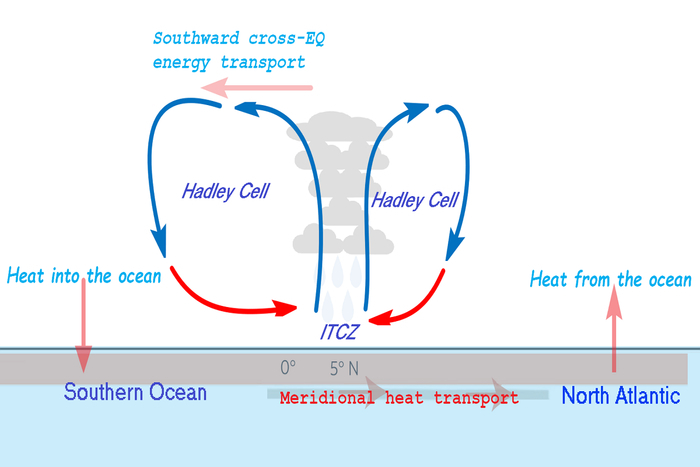ACADEMIA
Chinese scientists show why meridional heat transport is underestimated
The Atlantic Meridional Overturning Circulation (AMOC) is a phenomenon responsible for transporting ocean heat northward through the Atlantic Ocean. This process significantly influences the Arctic and North Atlantic oceanic climate and the Eurasian continental climate. The corresponding cross-equatorial northward heat transport also determines the location of the Intertropical Convergence Zone (ITCZ), affecting the global energy and rainfall distribution. Changes in ocean net surface heat flux play an important role in modulating the variability of the AMOC and hence the regional and global climate. However, the spread of simulated surface heat fluxes is still large and AMOC underestimation is common, due to poorly represented dynamical processes involving multi-scale interactions within the model simulations. 
Recently publishing their work in Advances of Atmospheric Sciences, Prof. Chunlei Liu, South China Sea Institute of Marine Meteorology, Guangdong Ocean University located in Zhanjiang, China, and collaborators from the University of Reading, UK and the University of Cambridge, UK have presented new findings on why heat loss over the North Atlantic is underestimated in state-of-the-art atmospheric climate model supercomputer simulations.
In their study, the DEEPC (Diagnosing Earth's Energy Pathways in the Climate system) dataset is used as the “truth” for comparison. DEEPC dataset is constructed using the energy conservation method mainly by Professor Liu and Professor Allan from the University of Reading. This dataset has been widely used by climatologists within the research community as it provides reasonable agreement regarding inferred oceanic heat transport with the in-situ RAPID (Rapid Climate Change-Meridional Overturning Circulation and Heat flux array) observations in both variability and quantity.
“The heat loss from the AMIP6 ensemble mean north of 26°N in the Atlantic is about 10 watts per square meter less than DEEPC, and the inferred meridional heat transport is about 0.3 petawatts (1 petawatt = 1015 watts) lower than the 1.22 petawatts from RAPID and DEEPC.” said co-author Dr. Ning Cao. “These findings can help the research community more accurately interpret the historical simulations and projections produced by contemporary models.”
After further investigation, the team found that low model horizontal resolution produced discrepancies between simulations. They showed that by increasing the resolution, it is possible to improve surface heat flux simulations north of 26°N and the inferred heat transport at 26°N in the Atlantic.
"Although there are problems in simulations, the climate model still plays an important role in climate change research.” said Professor Liu. "Further work is needed to improve model simulations of surface fluxes, and research to reduce observational flux uncertainty is also ongoing through collaboration with the University of Reading and UK Met Office."

